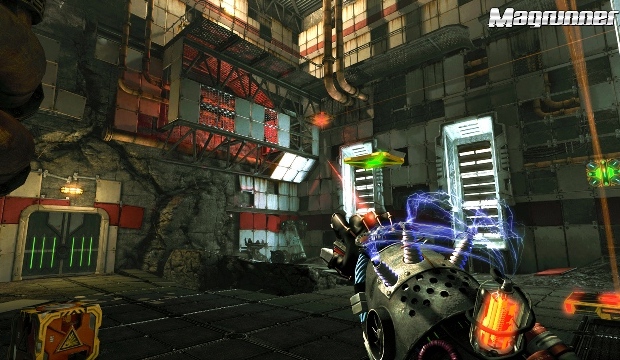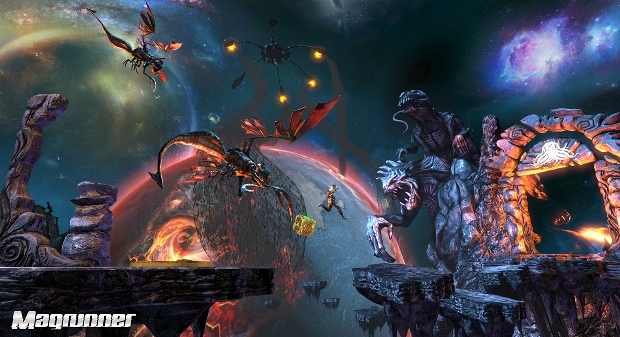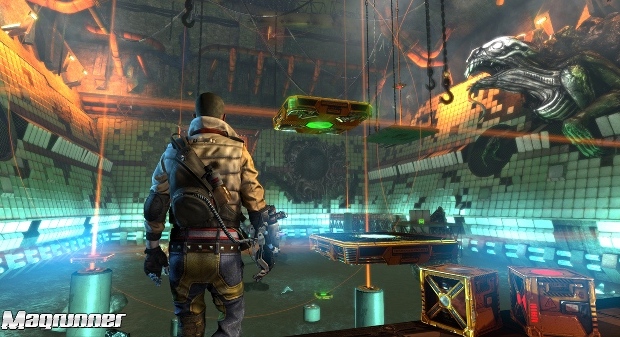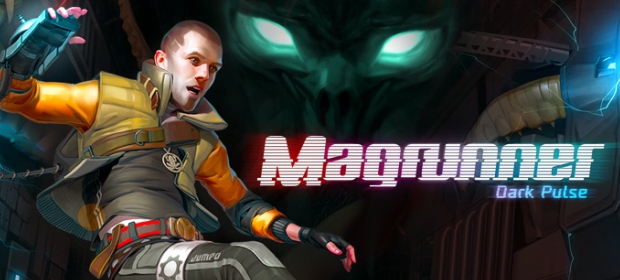When I was putting together my first PC build after years as a console gamer, I made a conscious decision to purchase a wired keyboard and mouse. Why? I hear you ask. Well, at times, gaming can be quite frustrating. And at the worst of these times, my controller would find itself airborne, hurtling towards the wall while I could only watch, rage instantly replaced by regret, as it smashed into several pieces and clattered to the floor. Magrunner: Dark Pulse was the first game in a long time that brought me to the brink of a peripheral-based outburst, but thankfully my mouse cord hung on for dear life. Strangely, Valve’s Portal, which is an obvious and huge influence on this magnetic puzzler, never made me feel the same. That is just one difference between the two; one difference, among many.
In Magrunner: Dark Pulse, you find yourself in the body of Dax Ward, a techno-wizard competing for a place in a prestigious deep space exploration project. The trials, witnessed the world over, are hosted by the Gruckezber Corporation, a huge global conglomerate responsible for revolutionary technologies such as LifeNet, a sort of universally-adopted Facebook, that has seemingly replaced all direct human interaction – although it isn’t really explained very clearly. You are aided by your guardian Gamaji, a mutant who has raised you from childhood after the tragic death of you parents. Of course, things don’t go to plan for Dax and soon he finds himself not fighting for a place in the program but fighting for his very soul – and the souls of all humanity.
So: shady, world-dominating corporation? Check. Technologically-dependent human society? Check. Orphaned youth with unattainable dreams? Check. I can only imagine that at a certain point, FrogWares must have been thinking to themselves, “This is beginning to sound formulaic”, to which a lowly intern piped up: “Hey, you know what someone hasn’t tried to incorporate into modern media in a while? The Cthulhu mythos.” And someone listened to them. Now, if this was the only downfall of the narrative then it could almost be excused, as Lovecraft’s tales have a notoriously bad track record outside of their written form. But the entire plot, character development and writing is so bad that it beggars belief.
For example, early on in the game you are introduced to Cassandra, a reporter for Gruckezber Corporation’s PR division, who immediately shuns Dax’s lower-class beginnings and dismisses him as a potential winner. A short time later, Dax has developed an inexplicable relationship with her and vows to save her at all costs. It’s forced, unexplainable and just plain ludicrous. Your multi-limbed mentor Gamaji seems to have trouble being accepted in society as a mutant, a character trait that it so completely irrelevant to the plot it’s a wonder why it was ever included at all. The Cthulhu-summoning antagonist Xander, a senior Gruckezber Corporation employee, is almost a caricature of an evil villain, complete with the obligatory maniacal laugh.

The Lovecraftian element feels like someone just skimmed through The Call of Cthulhu and thought that was more than enough to go right ahead and make it a core part of the storyline. The whole thing is just a mess that has far too many ingredients to devote enough time to competently realise even one aspect of the plot. The final nail in the coffin is how badly the narrative suffers when a player becomes stuck on a particularly fiendish level. The story is only progressed through the inter-mission elevator rides, and so when you become stuck on a puzzle for a long-time, you almost forget what the hell is going on.
And stuck you will get. If you’ve ever played Portal (and who hasn’t?) you know what to expect. Enter the room, solve the puzzle, find a way out. Rinse, repeat. The difference here is magnets. It’s a simple concept: charged objects either repel or attract, depending on which colour you shoot them with. Every charged object generates a magnetic field, easily viewed by a tap of the ‘F’ key, which can be used to fire objects around, raise & lower platforms, activate switches or even destroy enemies. The enemies in question initially take the form of turrets, but you soon come up against the Dark One’s minions. MagTech’s training rooms give way to abandoned subterranean chambers which in turn are superseded by what appear to be Unreal Tournament’s space maps with the Lovecraft mod installed. So at least wasn’t just Portal that was plundered for materials to make this game.

A spark of originality does present itself in form of the robo-canine sidekick, Newton. Initially, I misheard his introduction as “Putin” which would have made the game a whole lot more interesting. Magnetically-charged Newton can be shot onto most surfaces, providing that extra bit of push or pull when needed. It’s very well implemented and adds an extra tool for dealing with tricky puzzles. The first-person POV in a platformer can be so terribly frustrating and there are times in Magrunner that will make you tear your hair out. The later appearance of mobile enemies is poorly thought-out, and you are utterly defenceless against them unless you stumble upon a conveniently-placed explosive crate containing a launcher. Gamers have been trained to point and shoot when presented with this viewpoint, and many will find themselves blasting magnetic waves at these abominations in a futile attempt to destroy them. It’s a little irritating and an unnecessary addition.
The game can be clearly broken into 3 graphically distinct locations, each beautiful in their own right. You begin in the sterile MagTech training rooms, glowing white walls interspersed with neon strips of blues, greens and oranges. Its a pretty standard future environment but it is well realised, if a little dull. After things begin take a turn in the plot, you are forced off the beaten track to the forgotten prototype rooms. These dank, decrepit areas are nicely-formed but again, it’s nothing we’ve haven’t seen before in Portal 2. It even comes complete with mad scribbles on the walls a la Portal, but this time alluding to the end of the world and the coming of the Dark Ones.

That said, the final areas are somewhat original, taking place in space, on floating debris orbiting the earth. Aesthetically, this is the strongest area. It’s beautifully decorated with statues of the ancient ones, seemingly frozen in time. The view from up there is almost breathtaking at times, particularly when Cthulhu himself appears overheard, leering ominously as you scramble around below, trying to progress to the next area. The sense of scale of the beast is fantastic and completely underused. It really is a treat. The voice-acting, and audio in general, is pretty average. Nothing stands out, but it serves its purpose well.
VERDICT: Magrunner: Dark Pulse completely and unabashedly rips off the Portal franchise. It does make a vain attempt to add its own elements but just feels too cluttered. One could argue that being a clone of a popular game is not necessarily a bad thing, and that there are many fine copies out there that are great in their own right. But this is not a very good game and brings little merit of its own to the table.
Some would say the practice is carried on in the film industry all the time, with so many action films and rom-coms churning out the same old story year after year, with little tweaks separating them. But why should that be tolerated? Why should we accept the failings of film just because of the numerous comparisons that are made between the two mediums? Part of me wonders how this would have been received had Valve taken it, changed a small few details (places/character names) and released it as Portal 2.5. Is a poor imitation of a beloved franchise criminal enough to damn a potentially-decent game? In this case, it almost certainly is.

AVERAGE. The epitome of a 50/50 game, this title will be unspectacular but inoffensive, charmless but amiable. We aren’t condemning a game by scoring it a 5, but we certainly aren’t championing it, either.






